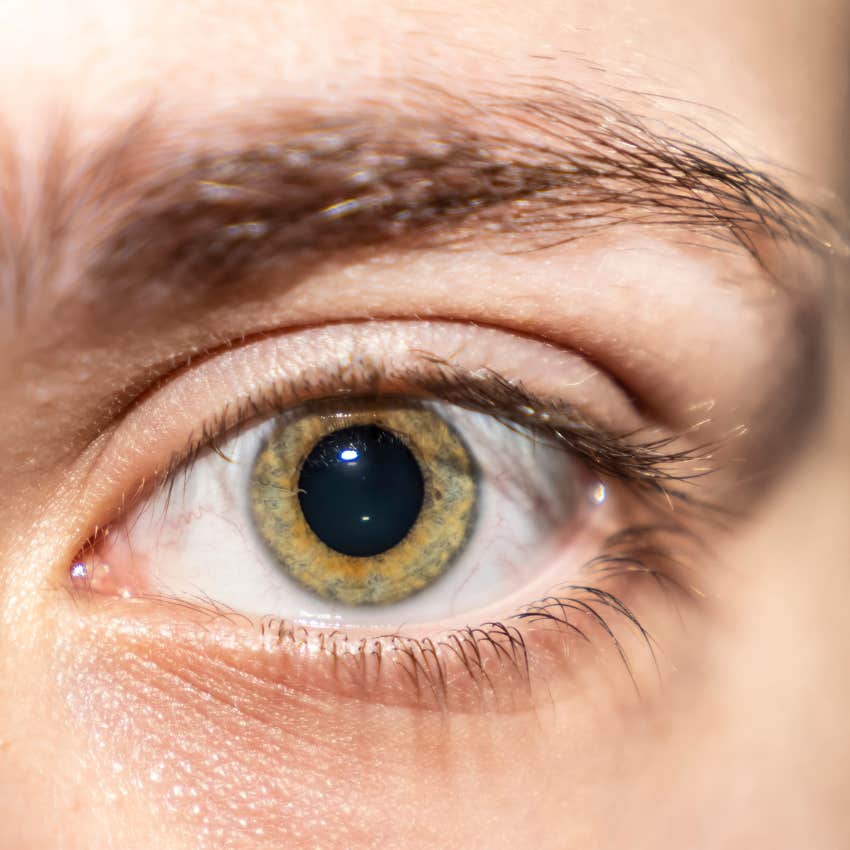People Who Do This Weird Thing With Their Eyes Secretly Like You, According To Research
The secret giveaway that someone's crushing on you? Look at their eyes.
 Kevin Liang | Unsplash
Kevin Liang | Unsplash Pupils are the black circles located in the center of your iris, or the colored part of your eye. The pupil allows light to enter your eye and often changes in size.
When your pupils appear larger, they're dilated. The most common reason for pupils to dilate is dim lighting. Your eyes will dilate to allow more light to enter a dark setting.
Similarly, your pupils will get smaller in brightness to prevent excessive light from entering the eyes. However, there are several other reasons your pupils may dilate. According to optometrist Gary Heiting, pupils may dilate due to medications, eye injury, brain injury or disease, recreational drug use, and even attraction.
According to research, when someone is attracted to you, their pupils naturally dilate.
 EVdesing EV / Shutterstock
EVdesing EV / Shutterstock
The iris muscles that determine when your pupils dilate are controlled by the autonomic nervous system, which is responsible for uncontrollable reactions.
In some cases, dilated eyes are an involuntary response to attraction and arousal. When your nervous system is stimulated, your body releases various hormones depending on whether you are experiencing lust, attraction, or attachment.
While lust is driven by a strong physical desire, attraction and attachment encompass a strong emotional relationship or interest in someone. Research suggests that eye contact is essential in human interaction, and changes in emotion can cause dilation.
For example, in a 2012 study, 325 men and women were recruited to watch adult videos as their pupil size was monitored. The study found that the videos led to pupil dilation among both genders. This means that viewing images, videos, or seeing someone you like or find attractive in person can cause pupil dilation.
This pupil dilation may, in turn, play a part in who we pursue romantically, according to a study that found that men found women with larger pupils more attractive. The men in the study described women with larger pupils as more feminine and soft, while women with smaller pupils were considered cold or hard.
This may be because we are hardwired to understand that dilated pupils equate to attraction, so the men were more likely to find attractive the women whose eyes were signaling that they were also feeling that attraction.
The hypothalamus of the brain, which is involved in our reward pathway, affects love. The hypothalamus produces and releases dopamine when you do things you enjoy, including spending time with someone you love. The hormones dopamine and norepinephrine are also released when we're attracted to someone and are what make us excited and euphoric.
Similarly, oxytocin, also known as the “cuddle hormone,” is released from the hypothalamus during the attachment stage of a relationship, which is a large factor in long-term relationships and intimacies. According to Katherine Wu, large levels of oxytocin are released during precursors to bonding, such as being intimate and childbirth.
Each of these love hormones enhances pupil dilation, meaning that your pupils are likely to dilate when you look at someone you love.
Pupil dilation (or a lack thereof) isn't the only sign of attraction. Since several emotions and events can influence one's pupil size, you must also look for nonverbal cues to see if someone is attracted to you:
1. Mutual eye contact
Pupil dilation isn't the only important aspect of eye contact. If someone is attracted to you, they're more likely to make eye contact with you more often and also hold it for longer.
2. Increased touching
A study found that touch leads to increased attraction.
3. Mirroring
A 2008 review of three previous studies found that people are more likely to mirror (or mimic) people they find attractive. Each of these can be categorized as an act of engagement, often used when someone is attracted to you.
Sydney Taylor is a writer who focuses on news and entertainment topics. She has been featured in Flipboard, The New York Public Library, Health Affairs, Metal Injection, Loudwire, PurseBlog, and more.

